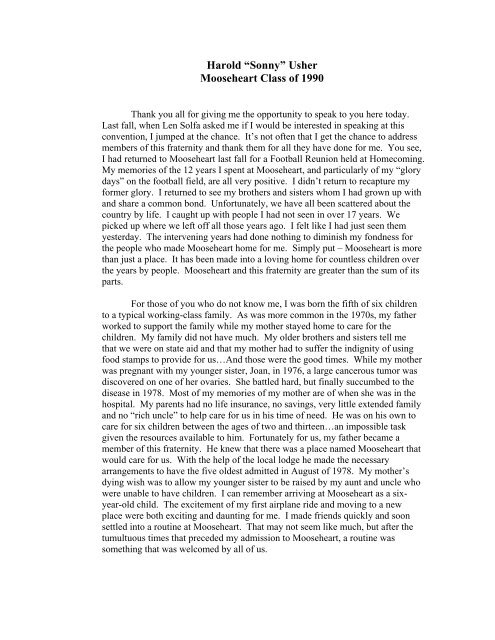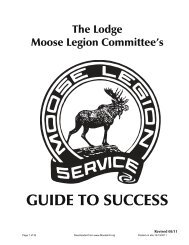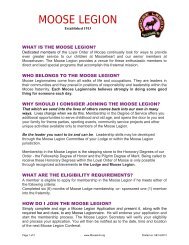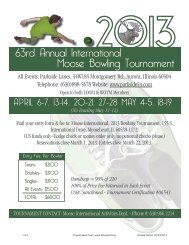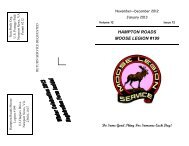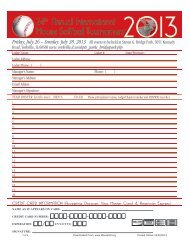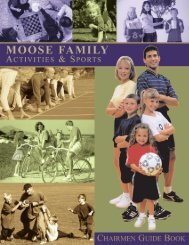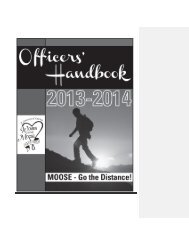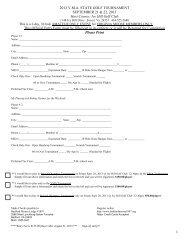Harold âSonnyâ Usher Mooseheart Class of 1990
Harold âSonnyâ Usher Mooseheart Class of 1990
Harold âSonnyâ Usher Mooseheart Class of 1990
You also want an ePaper? Increase the reach of your titles
YUMPU automatically turns print PDFs into web optimized ePapers that Google loves.
<strong>Harold</strong> “Sonny” <strong>Usher</strong><strong>Mooseheart</strong> <strong>Class</strong> <strong>of</strong> <strong>1990</strong>Thank you all for giving me the opportunity to speak to you here today.Last fall, when Len Solfa asked me if I would be interested in speaking at thisconvention, I jumped at the chance. It’s not <strong>of</strong>ten that I get the chance to addressmembers <strong>of</strong> this fraternity and thank them for all they have done for me. You see,I had returned to <strong>Mooseheart</strong> last fall for a Football Reunion held at Homecoming.My memories <strong>of</strong> the 12 years I spent at <strong>Mooseheart</strong>, and particularly <strong>of</strong> my “glorydays” on the football field, are all very positive. I didn’t return to recapture myformer glory. I returned to see my brothers and sisters whom I had grown up withand share a common bond. Unfortunately, we have all been scattered about thecountry by life. I caught up with people I had not seen in over 17 years. Wepicked up where we left <strong>of</strong>f all those years ago. I felt like I had just seen themyesterday. The intervening years had done nothing to diminish my fondness forthe people who made <strong>Mooseheart</strong> home for me. Simply put – <strong>Mooseheart</strong> is morethan just a place. It has been made into a loving home for countless children overthe years by people. <strong>Mooseheart</strong> and this fraternity are greater than the sum <strong>of</strong> itsparts.For those <strong>of</strong> you who do not know me, I was born the fifth <strong>of</strong> six childrento a typical working-class family. As was more common in the 1970s, my fatherworked to support the family while my mother stayed home to care for thechildren. My family did not have much. My older brothers and sisters tell methat we were on state aid and that my mother had to suffer the indignity <strong>of</strong> usingfood stamps to provide for us…And those were the good times. While my motherwas pregnant with my younger sister, Joan, in 1976, a large cancerous tumor wasdiscovered on one <strong>of</strong> her ovaries. She battled hard, but finally succumbed to thedisease in 1978. Most <strong>of</strong> my memories <strong>of</strong> my mother are <strong>of</strong> when she was in thehospital. My parents had no life insurance, no savings, very little extended familyand no “rich uncle” to help care for us in his time <strong>of</strong> need. He was on his own tocare for six children between the ages <strong>of</strong> two and thirteen…an impossible taskgiven the resources available to him. Fortunately for us, my father became amember <strong>of</strong> this fraternity. He knew that there was a place named <strong>Mooseheart</strong> thatwould care for us. With the help <strong>of</strong> the local lodge he made the necessaryarrangements to have the five oldest admitted in August <strong>of</strong> 1978. My mother’sdying wish was to allow my younger sister to be raised by my aunt and uncle whowere unable to have children. I can remember arriving at <strong>Mooseheart</strong> as a sixyear-oldchild. The excitement <strong>of</strong> my first airplane ride and moving to a newplace were both exciting and daunting for me. I made friends quickly and soonsettled into a routine at <strong>Mooseheart</strong>. That may not seem like much, but after thetumultuous times that preceded my admission to <strong>Mooseheart</strong>, a routine wassomething that was welcomed by all <strong>of</strong> us.
My father always dreamed <strong>of</strong> having our family back together. In 1981 heremarried and took four <strong>of</strong> us out <strong>of</strong> <strong>Mooseheart</strong>. My older brother, Ed, chose tostay there as a junior in high school and finish his studies. I can remember tryingto adjust to my life outside <strong>of</strong> <strong>Mooseheart</strong>. I had a romantic view <strong>of</strong> the outsideworld that was quickly dashed. After living outside <strong>of</strong> <strong>Mooseheart</strong> for six months,my sister, Tammy, and I asked our father to allow us to return there. You see, wemissed the structure and boundaries that made us feel secure at <strong>Mooseheart</strong>.Upon my return to <strong>Mooseheart</strong>, my brother Ed was one <strong>of</strong> the footballstars on the Red Rambler varsity Football team. I recall attending the homefootball games at <strong>Mooseheart</strong> Stadium on Saturday afternoons in the fall. I wasproud <strong>of</strong> my brother and could not wait to have my chance to be just like him. Hewas my hero. Ed gained the third most yards in the State <strong>of</strong> Illinois in 1982 andreceived all the honors that went with it. He graduated from <strong>Mooseheart</strong> in 1983and moved to Connecticut to get married and have a family while I remained at<strong>Mooseheart</strong>. I didn’t get to see him as much after that and I missed him. Mysister and I remained.When I entered seventh grade, my anticipation <strong>of</strong> playing football wasover. I finally had my chance to prove myself…or so I thought. I showed up atthe first practice ready to take the ball and run just like my brother had. Thecoaches <strong>of</strong> the junior high football team thought I could best serve the team as an<strong>of</strong>fensive guard. My disappointment could not have been greater. I dealt with itand played my best.I returned to play my eighth grade year and had two new coaches on theteam. One <strong>of</strong> them was a huge former All-American <strong>of</strong>fensive lineman fromNorthern Illinois University named Charlie Palochko. He was an intimidating,no-nonsense kind <strong>of</strong> guy. Underneath that rough exterior, though, was a guy whoreally cared about us. Charlie really took me under his wing and I had a greatyear playing running back on that team. The following summer, I went to workfor Charlie at the <strong>Mooseheart</strong> General Store. He taught me the importance <strong>of</strong> agood work ethic. I think his ulterior motive was to keep me away from the girlsso I didn’t mess up my chance to play football. He saw the potential in me to dogreat things. I wanted to live up to his expectations. He filled a void in my lifethat was created when my father could not be there for me when it came time toplay sports. I think I made $1.65 per hour that summer. I hope he felt like he gothis money’s worth…I know I got mine. He helped me through a lot <strong>of</strong> things inthose difficult adolescent years. He told me to call him “Uncle Charlie”. I guessthere’s a little irony in that I used to make fun <strong>of</strong> him for losing his hair. Anotherlesson learned that he can take credit for.My sister Tammy graduated <strong>Mooseheart</strong> in 1987 as Valedictorian <strong>of</strong> herclass. With this fraternity’s help, she became an elementary school teacher. Shehas three small children and still teaches school in Connecticut.
Playing football at <strong>Mooseheart</strong> was very fulfilling for me. Therelationships I made with my teammates and the things I learned are irreplaceable.I was a freshman on Gary Urwiler’s 1986 undefeated football team. I got into thegames when the Red Ramblers were blowing out their competition-a commonoccurrence that year. I recall getting into the play<strong>of</strong>f game for one play. I was onthe hands team expecting an on-sides kick late in a close game. The ball waskicked and squibbed my way. I was about 130 pounds at that time and, notwanting to make a mistake to lose the game for the team, I allowed the ball to goby me. Gary was behind me and picked up the ball. He got a few yards on thereturn and I didn’t screw up…a good outcome as far as I was concerned.My sophomore year brought Charlie Palochko to the team as the linecoach along with a new head coach. Len Solfa also became involved with theteam. I was fortunate to become a varsity starter that year on <strong>of</strong>fense and defense.My junior year I also started on <strong>of</strong>fense and defense. I was really lookedafter by the coaching staff. That year, I managed to rush for over 1000 yards andreally felt that we had a good team with some good size on the line. We didn’tmake the play<strong>of</strong>fs, though.My senior year <strong>of</strong> high school was one which I will never forget. Therewere high expectations going into the year. As a team, we did not fare well. Ithink my teammates can take pride in the fact that behind them, I became theleading rusher in the State <strong>of</strong> Illinois. I was not a big guy…I’m still not. Beingable to overcome my lack <strong>of</strong> size to compete with much larger schools and muchlarger players is, I think, a tribute to <strong>Mooseheart</strong> and the people who raise thechildren there. It is important to understand that the kids at <strong>Mooseheart</strong> use sportsto measure themselves against others in the outside world. I know that I felt that Iwas as good as anyone we played against because <strong>of</strong> the confidence instilled inme by my coaches. I am grateful to them for that.The lessons I learned and the values taught to me at <strong>Mooseheart</strong> havecontributed greatly to my life after <strong>Mooseheart</strong>. When I was 25, I decided tobecome a police <strong>of</strong>ficer. Now, I cannot say that becoming a police <strong>of</strong>ficer was a“life long dream” as many in law enforcement will tell you. I was looking for apr<strong>of</strong>ession in which I could make a decent living and still give me the satisfactionthat I was helping society instead <strong>of</strong> burdening it. Now, when I say “decided” tobecome a police <strong>of</strong>ficer, it sounds like a simple proposition. The process isanything but simple. There are written and physical exams, a medical exam, apsychological exam and a polygraph exam. <strong>Mooseheart</strong> prepared me for thisprocess. I’ve been through my share <strong>of</strong> psychological exams. They usuallyconsist <strong>of</strong> some sort <strong>of</strong> personality index multiple choice questionnaire. There isthen a follow-up face to face meeting with the examiner. He asks a lot <strong>of</strong>questions. When I begin to tell them about <strong>Mooseheart</strong> and my upbringing there,they become keenly interested. I think they are expecting to uncover some deeprootedproblems related to me not growing up in a traditional family. I am always
happy to disappoint them by telling them about my Moose family and about allthe positive things that <strong>Mooseheart</strong> has meant to me.I am an eleven year veteran police <strong>of</strong>ficer. I have been a patrolmanthroughout my career and can’t tell you how satisfying it can be. The good thingsI’ve seen as a police <strong>of</strong>ficer far outweigh the bad. I am an evidence technicianand a field training <strong>of</strong>ficer and am a member <strong>of</strong> the Danbury Police DepartmentSWAT Team. I am currently assigned to the Community Services Divisionwhere I act as a liaison between the police department and the downtownbusinesses. I am proud <strong>of</strong> my pr<strong>of</strong>ession and feel that <strong>Mooseheart</strong> helped mebecome a good police <strong>of</strong>ficer.One <strong>of</strong> the great challenges facing police <strong>of</strong>ficers is maintaining a healthybalance between work and family. It is important to be surrounded by peoplewho love you and understand the job and who are willing to make sacrifices. Thesacrifices they make are <strong>of</strong>ten more demanding than the sacrifices made by the<strong>of</strong>ficers themselves. I am very fortunate to be married to a person just like that –my wife Jeannine. Honey can you please stand up. I have a 13-year-old daughternamed Emily who could not be here. We also have a 20-month-old daughternamed Brianna who is at home.Anytime I’m asked to speak about <strong>Mooseheart</strong>, I try to answer onefundamental question – What has <strong>Mooseheart</strong> meant to me? The answer is simple– everything. <strong>Mooseheart</strong> and the people <strong>of</strong> this fraternity have left an indelibleimpression upon my life. <strong>Mooseheart</strong> is part <strong>of</strong> the fabric <strong>of</strong> my being. Just asparents leave their mark on their children, <strong>Mooseheart</strong> has left its mark on me. Icannot tell you what my life would be like without <strong>Mooseheart</strong>. The answer tothat is as unknowable as the question <strong>of</strong> what my life would be like if my motherhad survived. I can only tell you that all I am today and all that I have today Iowe to <strong>Mooseheart</strong> and to those <strong>of</strong> you who have the courage and commitment tosupport our great fraternity. All <strong>of</strong> us have faced challenges in our lives thatwe’ve had to overcome. I am no different. Some people are permitted to blameothers for their misfortunes and wallow in self-pity. The thing I am most gratefulto <strong>Mooseheart</strong> for is that I was never given an excuse to fail. Instead, <strong>Mooseheart</strong>gave me the ability to succeed.


